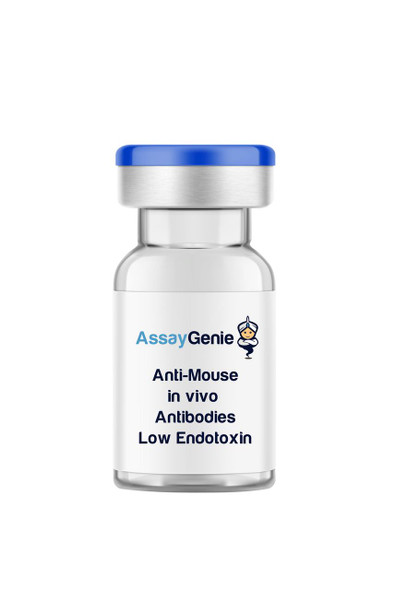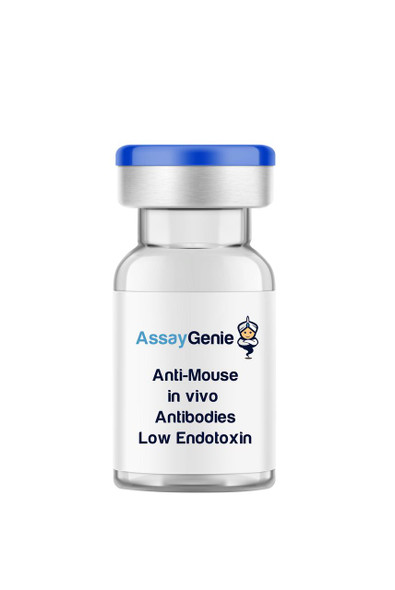Anti-Mouse CD172a In Vivo Antibody - Low Endotoxin
- SKU:
- IVMB0029
- Product Type:
- In Vivo Monoclonal Antibody
- Clone:
- P84
- Protein:
- CD172a
- Isotype:
- Rat IgG1 kappa
- Reactivity:
- Mouse
- Synonyms:
- SIRPalpha
- Synonyms:
- SHPS-1
- Synonyms:
- BIT
- Synonyms:
- P84
- Synonyms:
- PTPNS1
- Synonyms:
- CD172 antigen-like family member A
- Endotoxin Level:
- Low Endotoxin
- Host Species:
- Rat
- Applications:
- Blocking
- Applications:
- CyTOF
- Applications:
- FC
- Applications:
- IHC FF
- Applications:
- IP
Description
| Product Name: | Anti-Mouse CD172a In Vivo Antibody - Low Endotoxin |
| Product Code: | IVMB0029 |
| Size: | 1mg, 5mg, 25mg, 50mg, 100mg |
| Clone: | P84 |
| Protein: | CD172a |
| Product Type: | Monoclonal Antibody |
| Synonyms: | SIRPα, SHPS-1, BIT, P84, PTPNS1, CD172 antigen-like family member A |
| Isotype: | Rat IgG1 κ |
| Reactivity: | Mouse |
| Immunogen: | Mouse brain membrane protein |
| Applications: | B, CyTOF®, FC, IHC FF, IP |
| Formulation: | This monoclonal antibody is aseptically packaged and formulated in 0.01 M phosphate buffered saline (150 mM NaCl) PBS pH 7.2 - 7.4 with no carrier protein, potassium, calcium or preservatives added. |
| Endotoxin Level: | < 1.0 EU/mg as determined by the LAL method |
| Purity: | ≥95% monomer by analytical SEC >95% by SDS Page |
| Preparation: | Functional grade preclinical antibodies are manufactured in an animal free facility using only In vitro protein free cell culture techniques and are purified by a multi-step process including the use of protein A or G to assure extremely low levels of endotoxins, leachable protein A or aggregates. |
| Storage and Handling: | Functional grade preclinical antibodies may be stored sterile as received at 2-8°C for up to one month. For longer term storage, aseptically aliquot in working volumes without diluting and store at -80°C. Avoid Repeated Freeze Thaw Cycles. |
| Applications: | B, CyTOF®, FC, IHC FF, IP |
| Recommended Usage: | FC The suggested concentration for this P84 antibody for staining cells in flow cytometry is ≤ 1.0 µg per 106 in a volume of 100 µl. Titration of the reagent is recommended for optimal performance for each application. CyTOF® |
| Reactivity: | Mouse |
| Host Species: | Rat |
| Specificity: | Clone P84 recognizes an epitope on mouse CD172a. |
| Antigen Distribution: | CD172a is expressed on monocytes, macrophages, dendritic cells, and neuronal cells. |
| Immunogen: | Mouse brain membrane protein |
| Concentration: | ≥ 5.0 mg/ml |
| Endotoxin Level: | < 1.0 EU/mg as determined by the LAL method |
| Purity: | ≥95% monomer by analytical SEC >95% by SDS Page |
| Formulation: | This monoclonal antibody is aseptically packaged and formulated in 0.01 M phosphate buffered saline (150 mM NaCl) PBS pH 7.2 - 7.4 with no carrier protein, potassium, calcium or preservatives added. |
| Preparation: | Functional grade preclinical antibodies are manufactured in an animal free facility using only In vitro protein free cell culture techniques and are purified by a multi-step process including the use of protein A or G to assure extremely low levels of endotoxins, leachable protein A or aggregates. |
| Storage and Handling: | Functional grade preclinical antibodies may be stored sterile as received at 2-8°C for up to one month. For longer term storage, aseptically aliquot in working volumes without diluting and store at -80°C. Avoid Repeated Freeze Thaw Cycles. |
CD172a antibody, clone P84, recognizes CD172a, also known as single regulatory protein α (SIRPα) (signal regulatory protein alpha) or Src homology 2 domain-containing phosphatase substrate-1 (SHP-1), a type I transmembrane glycoprotein with three Ig-like extracellular domains and two cytoplasmic immunoreceptor tyrosine-based inhibition motifs (ITIMs)1. SIRPα is expressed predominantly in myeloid cells2 - including monocytes, macrophages, and dendritic cells (DCs) - and neuronal cells3. The extracellular ligand for SIRPα, CD47 (or integrin-associated protein [IAP])4, is expressed in most cell types5. In macrophages, ligation of SIRPα by CD47 inhibits macrophage phagocytosis of self cells6,7. SIRPα also negatively regulates DC-mediated T cell activation and DC maturation8-10. CD47 is also upregulated on tumor cells, inhibiting the phagocytosis of tumor cells by macrophages11. Therapeutics targeting the CD47-SIRPα interaction, including antibodies and fusion proteins, are currently under preclinical and clinical study for various malignancies as a monotherapy or in combination with other therapeutics12.
| Technical Datasheet: | View |
| Protein: | CD172a |
| Function: | Negative regulation of several biological processes |
| Ligand/Receptor: | CD47, SP-A, SP-D |
| Research Area: | Cell Adhesion, Innate Immunity, Neuroscience |
Meet the team!
Shane Costigan
Territory Manager & Team Lead
Abdul Khadim
Sales Executive







